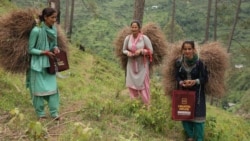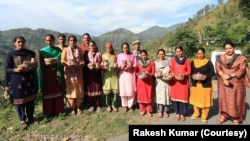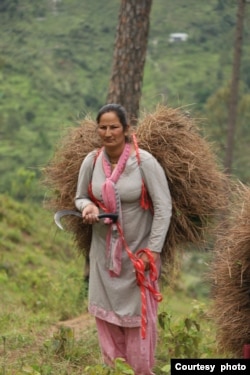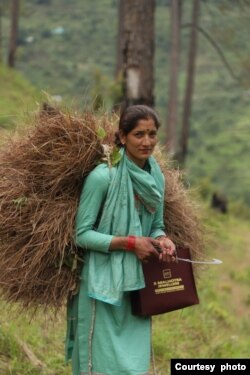Come summer, a group of women in India's northern state of Himachal Pradesh comb a nearby forest to gather dead pine needles that the trees have shed.
Strapping huge bundles on their backs, they lug the pine needles home, then boil them in water with glycerin to give them a sheen. After drying them, they use colorful threads to weave the pine needles into handcrafted products, such as pen stands, trays, bread boxes and coasters. It's a skill they mastered during a short training course.
In these Himalayan mountains, where most families rely on modest farm incomes, this work is putting money in their hands for the first time.
"I no longer need to borrow money from anyone. I help my husband as well in household expenses," said Lata Devi, a resident of Mandi district who is part of the group of about 40 women involved in the project.
The initiative in Mandi supported by the forest department, started about a year ago, has a twin purpose. It aims to provide local women with livelihoods and to reduce the risk of forest fires that have often ripped through the region where thick pine forests clothe the Himalayan slopes.
The clean-up operation in the forest gets rid of the pine needles that become highly flammable when they dry during the summer, a problem that authorities have long grappled with.
"Our main issue has been to solve the problem of forest fires. How do we deal with these pine needles?" Vasu Doegar, deputy conservator of forests in Mandi told VOA recently. He said that while the handicrafts project will not completely solve the problem, it is yielding benefits.
"It is increasing the overall economy and incomes of the households as well," he said.
Leaves become fuel, too
Authorities say turning the dead needles into handicrafts is just one of the projects to use pine needles. Others involve turning them into briquettes for fuel. The women also sell pine needles to briquette plants, but turning them into handicrafts provides a better, and sustained, income through the year.
Gathering needles from the forest is also an effective way to connect local communities with the region's fragile ecology. During monsoon months, women participate in tree-planting drives to revive degraded forest areas.
"When we take the public into confidence, it raises awareness and gives them a sense of responsibility," said Jiten Sharma, a project officer who leads the women's groups in the project. "It makes them understand the importance of conserving the environment."
Marketing the handicrafts can be a challenge but promoting them as eco-friendly products at local fairs and college campuses is helping. A recent bulk order from a nearby college gave the women a boost.
"We used to work till 12 or 1 at night and then get back to work in the day too. We managed to make 50 pen stands in a week," according to Dromati Thakur, one of the project participants.
The earnings and consequent self-confidence has provided the motivation to burn the midnight oil.
Another project participant, Nirma Thakur, uses the money both for household expenses and her children's education.
"I buy their books and uniforms with this money. I have also opened a bank account and try to put some money in it," she told VOA.
The way ahead
Authorities say they will try to connect women with corporations, government agencies and hotels in a state that is a tourist hot spot, so that they can secure more bulk orders. An outlet that will be stocked with these handicrafts also has been built on a busy highway, according to Deogar.
In a country struggling to create jobs, especially in remote areas, such entrepreneurial work is seen as the way ahead. Only about 10% of India's 1.4 billion people have formal jobs.
"In India, more and more people need to be self-employed," Sharma said. "This also helps the cause of empowerment of women."








